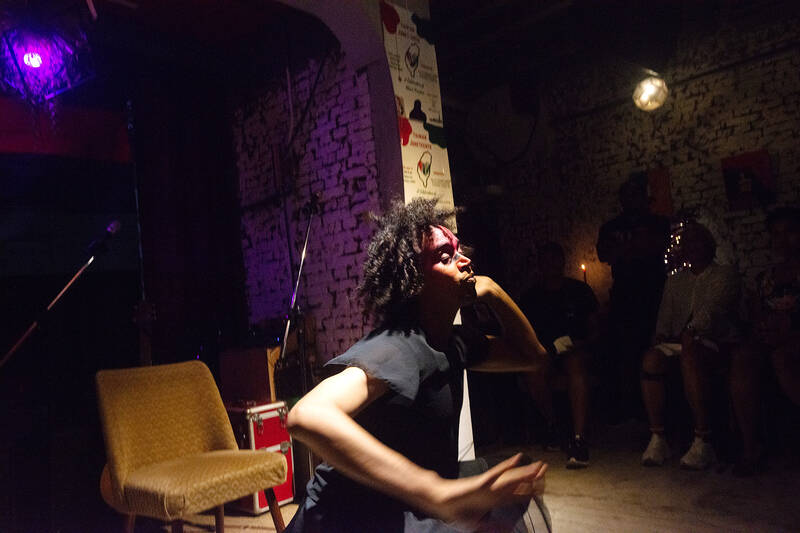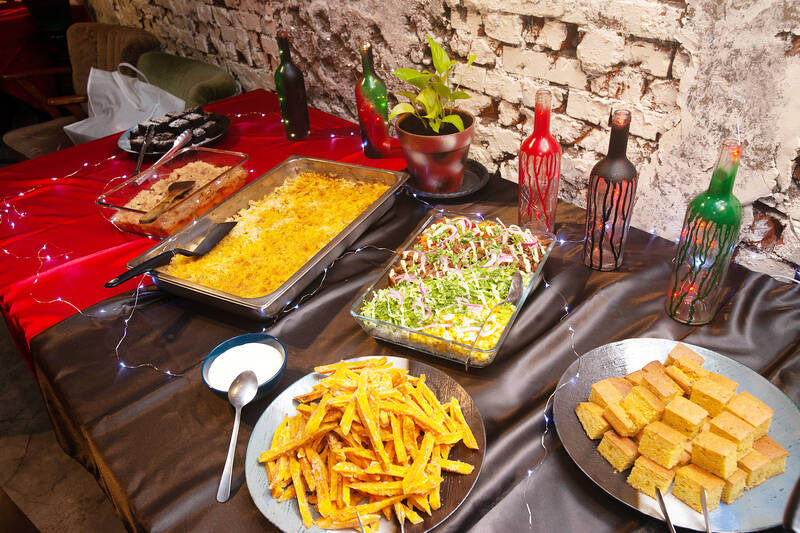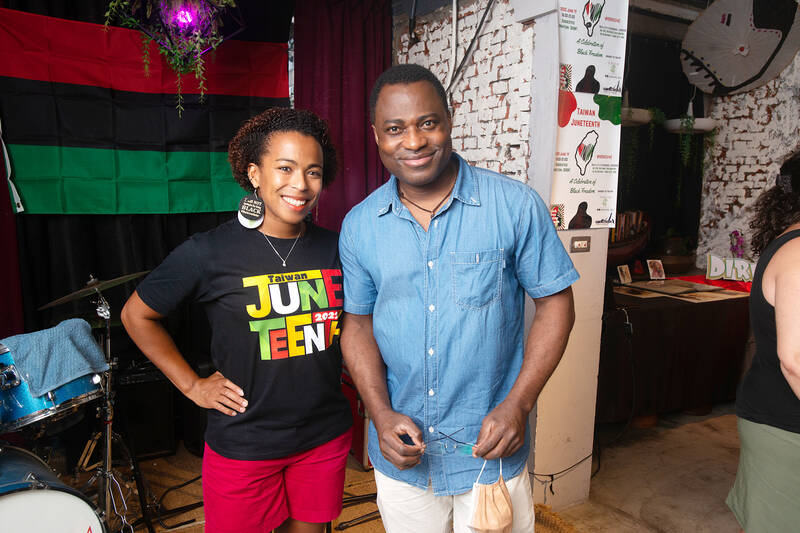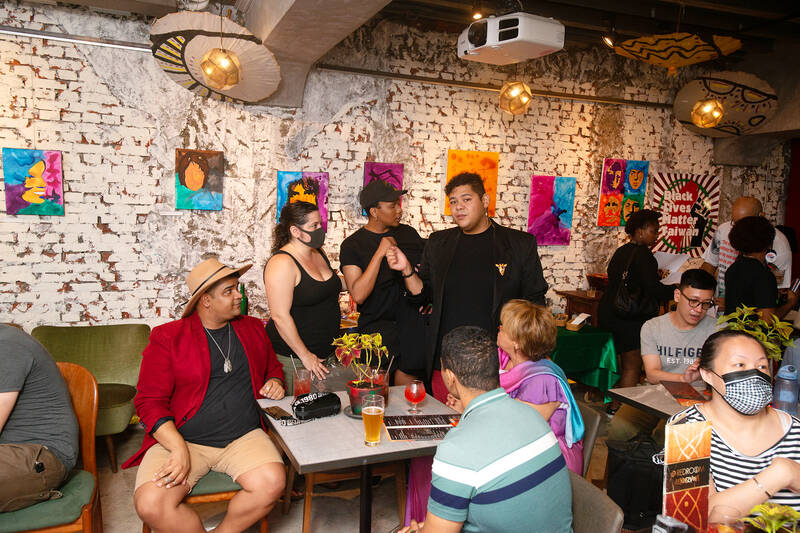When Toi Windham co-organized a Black Lives Matter rally in Taipei three years ago, she received some unfriendly comments questioning the relevance of such an event to Taiwan.
“They were like, don’t bring your American problems here, we’re not racist,” she says.
While it’s true that African-Americans don’t experience the same overt racial tension here as they do back home, microaggressions such as constant stares, people trying to touch her hair or making insensitive comments are part of Windham’s daily life. Discriminatory hiring practices still occur. Plus, blatant racism toward Southeast Asian migrant workers and the indigenous community regularly make the news. As Asians, Taiwanese also suffer from racism abroad, which has been exacerbated by the COVID-19 pandemic.

Photo courtesy of Black Lives Mattter Taiwan
Next Sunday, Windham is helping put on Taipei’s second annual Juneteenth celebration. In addition to celebrating the freeing of the last of America’s black slaves in 1865 and raising awareness of the continued struggles of black people “no matter where we go in this world,” this event also highlights the right for anyone in the world to exist and live regardless of race.
“Nobody’s free until everybody’s free,” Windham says, quoting black human rights activist Fannie Lou Hamer.
The event also helps facilitate a deeper understanding of African-American culture and history, which is crucial as Taiwanese have embraced many elements of it — especially in music, dance and fashion.

Photo courtesy of Black Lives Mattter Taiwan
“Hip-hop was not created out of joyfulness; it was created out of the hurt and pain and struggle that a lot of black people were experiencing,” Windham says. “You can’t just embrace one part of the culture and not try to understand the entirety of it.”
CELEBRATING FREEDOM
On June 19, 1865, the last of the black slaves in the US were freed in Texas. Locals began celebrating the occasion the following year, but it was only made a federal holiday in 2021.

Photo courtesy of Black Lives Mattter Taiwan
Awareness of Juneteenth varies even across the US. Windham celebrated Juneteenth every year growing up in Dallas, Texas, but her cousins from the east coast didn’t know much about it.
They celebrated by having a barbecue, visiting African-American museums, learning about their history and putting on singing and dancing performances.
Next weekend’s event will start with a breathing meditation workshop: “We have to acknowledge that there’s trauma and baggage we carry, specifically as black people, because of our history. We thought it’s a good idea to release that baggage and open ourselves up to the celebration,” Windham says.

Photo courtesy of Black Lives Mattter Taiwan
There will be a short video about the history of the occasion and speeches before transitioning to the songs and performances. The event will once again be held at the Red Room Rendezvous restaurant and bar, which has whipped up a vegan soul food menu that, with its peach cobbler, was especially popular last year.
ONGOING MICROAGGRESSIONS
As an educator, co-organizer Casey Abbott Payne says that he’s noticed an increased awareness among his young students of the issues black people face in the US after George Floyd was murdered by police officers in 2020. Most of them told him that they learned about it from watching YouTube videos.
But while Juneteenth is a time to reflect, it’s also about celebration and having a good time, Payne says. There may be other events, such as Windham’s ongoing Community Convos Taiwan event that may be more suitable for a deep dive into local racism, but he’s also experienced his fair share of issues in nearly two decades in Taiwan. The situation here is still better than being in the US, he says, especially as he doesn’t have to be afraid of the police.
Fewer people approach him to tell him that he looks like Will Smith nowadays, but passengers are too often reluctant to sit next to him on the MRT even when the train is packed. Windham has experienced the same sort of microaggressions.
“The stares are enough to deal with,” Windham says. “Sometimes I don’t want to leave the house because it’s like, who’s going to stare at me now? A lot of time we have to ignore a lot of these things, but they at some point start building up.”
People touching her hair without permission is another microaggression that she constantly endures.
“With our hair, there’s a deep history with beauty standards, being told that the way our hair looks is unacceptable and having to conform and assimilate. It’s a touchy subject — pun intended,” she says.
However, discrimination when hiring English teachers continues, Payne says. In 2006, a black candidate whom he recommended to replace him at his job was rejected because of his skin color. When Payne reminded the boss that he was also black, the boss said “Not that black!”
Recently, a black friend who owns an English school here was asked by his partner to do something about the abundance of black teachers at the school.
“They’ll also find ways to not mention being black, such as saying that they’re looking for someone ‘more handsome,’” Abbott says. “Right now, today, that’s still going on, but it’s better for sure.”
All proceeds from the event will go to funding Community Convos Taipei and more black-centered events, Windham says.
“There are gaps in our community that still need to be met, our goal is to create more and connect our community a bit more this year,” she says.

Oct. 27 to Nov. 2 Over a breakfast of soymilk and fried dough costing less than NT$400, seven officials and engineers agreed on a NT$400 million plan — unaware that it would mark the beginning of Taiwan’s semiconductor empire. It was a cold February morning in 1974. Gathered at the unassuming shop were Economics minister Sun Yun-hsuan (孫運璿), director-general of Transportation and Communications Kao Yu-shu (高玉樹), Industrial Technology Research Institute (ITRI) president Wang Chao-chen (王兆振), Telecommunications Laboratories director Kang Pao-huang (康寶煌), Executive Yuan secretary-general Fei Hua (費驊), director-general of Telecommunications Fang Hsien-chi (方賢齊) and Radio Corporation of America (RCA) Laboratories director Pan
The consensus on the Chinese Nationalist Party (KMT) chair race is that Cheng Li-wun (鄭麗文) ran a populist, ideological back-to-basics campaign and soundly defeated former Taipei mayor Hau Lung-bin (郝龍斌), the candidate backed by the big institutional players. Cheng tapped into a wave of popular enthusiasm within the KMT, while the institutional players’ get-out-the-vote abilities fell flat, suggesting their power has weakened significantly. Yet, a closer look at the race paints a more complicated picture, raising questions about some analysts’ conclusions, including my own. TURNOUT Here is a surprising statistic: Turnout was 130,678, or 39.46 percent of the 331,145 eligible party

The classic warmth of a good old-fashioned izakaya beckons you in, all cozy nooks and dark wood finishes, as tables order a third round and waiters sling tapas-sized bites and assorted — sometimes unidentifiable — skewered meats. But there’s a romantic hush about this Ximending (西門町) hotspot, with cocktails savored, plating elegant and never rushed and daters and diners lit by candlelight and chandelier. Each chair is mismatched and the assorted tables appear to be the fanciest picks from a nearby flea market. A naked sewing mannequin stands in a dimly lit corner, adorned with antique mirrors and draped foliage

The election of Cheng Li-wun (鄭麗文) as chair of the Chinese Nationalist Party (KMT) marked a triumphant return of pride in the “Chinese” in the party name. Cheng wants Taiwanese to be proud to call themselves Chinese again. The unambiguous winner was a return to the KMT ideology that formed in the early 2000s under then chairman Lien Chan (連戰) and president Ma Ying-jeou (馬英九) put into practice as far as he could, until ultimately thwarted by hundreds of thousands of protestors thronging the streets in what became known as the Sunflower movement in 2014. Cheng is an unambiguous Chinese ethnonationalist,